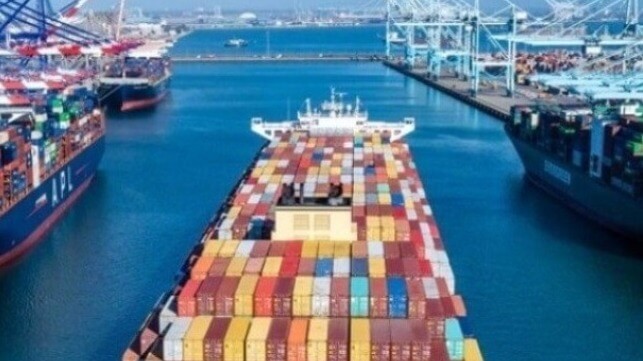Retailers Raise Imports Outlook Saying August Will be Highest in a Year

After months of reporting falling container volumes, the National Retail Federation is reporting that its expectations for retailers’ U.S. container imports are improving with August forecast to hit the highest level in nearly a year. Typically peak season as retailers stock up for stronger sales to the end of the calendar year, the retail trade group raised its forecast for volumes in the coming months, although remaining significantly below the peaks experienced in 2021 and 2022.
In the latest edition of the month Global Port Tracker, the NRF projects August will be the only month in 2023 to exceed import levels of two million TEU for the dozen largest port operations in the U.S. While they expect August will be the peak month for imports, they also increased their forecast for the following three months and filled out the forecast for the remainder of 2023. During the fourth quarter, they projected imports of more than 5.8 million TEU which would be an approximate five percent increase over the 5.5 million TEU for the fourth quarter of 2022.
“Port and package-delivery labor negotiations that threatened the supply chain at the beginning of the summer have been resolved and retailers are now focused on preparing for the all-important holiday season,” said Jonathan Gold, NRF Vice President for Supply Chain and Customs Policy. “There are always supply challenges to be faced but holiday merchandise is flowing into the country, and we expect to see a smooth shipping season ahead of the winter holiday shopping season.”
![]()
Among the factors the NRF pointed to as overhanging the supply chain and raising concerns among retailers were labor disputes. However, the U.S. West Coast ports reached a tentative agreement with the International Longshore & Warehouse Union, which is proceeding through the ratification process. At the same time, ILWU Canada ratified on August 4 its West Coast port contract for the more than 30 terminals in British Columbia. United Parcel Service, the largest delivery service, and the Teamsters also agreed on a tentative contract that avoided a potential August 1 strike.
“Dollar figures for international trade show imports remain in a year-over-year decline and cargo volume shows the same,” said Ben Hackett, founder of Hacket Associates. He notes the ports experienced double-digit year-over-year decreases in cargo volume this year despite consumer spending and U.S. employment having increased. Maersk on August 4 in its financial report pointed to retailers worldwide working down inventories as a key contributor to the declines in container volumes.

that matters most
Get the latest maritime news delivered to your inbox daily.
NRF raised its forecast for September through November ranging between half a percent and two percent as it expects retailers to slowly increase volumes versus earlier expectations. However, with the weak first half of 2023 and only a slow increase in volumes, the NRF is now forecasting full year 2023 import volume at 22.3 million TEU, down nearly 13 percent from last year. Imports for all of 2022 totaled 25.5 million TEU, down just over one percent from the record of 25.8 million TEU set in 2021.
The expectation is that with the strong economic indicators and moderating inflation that retailers will begin to slowly increase volumes after having worked down the levels in the warehouses built up over the past 12 to 18 months. While the NRF says cargo volumes should resume as inventories are depleted, major carriers including Maersk are providing a subdued outlook for the remainder of 2023.
